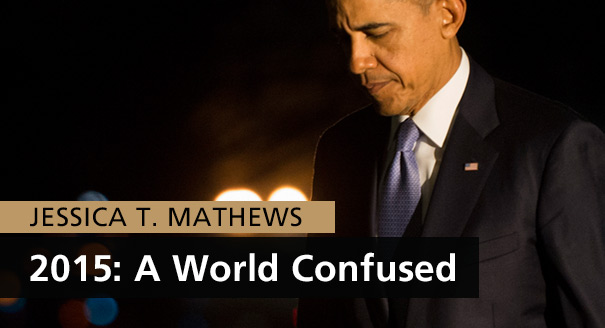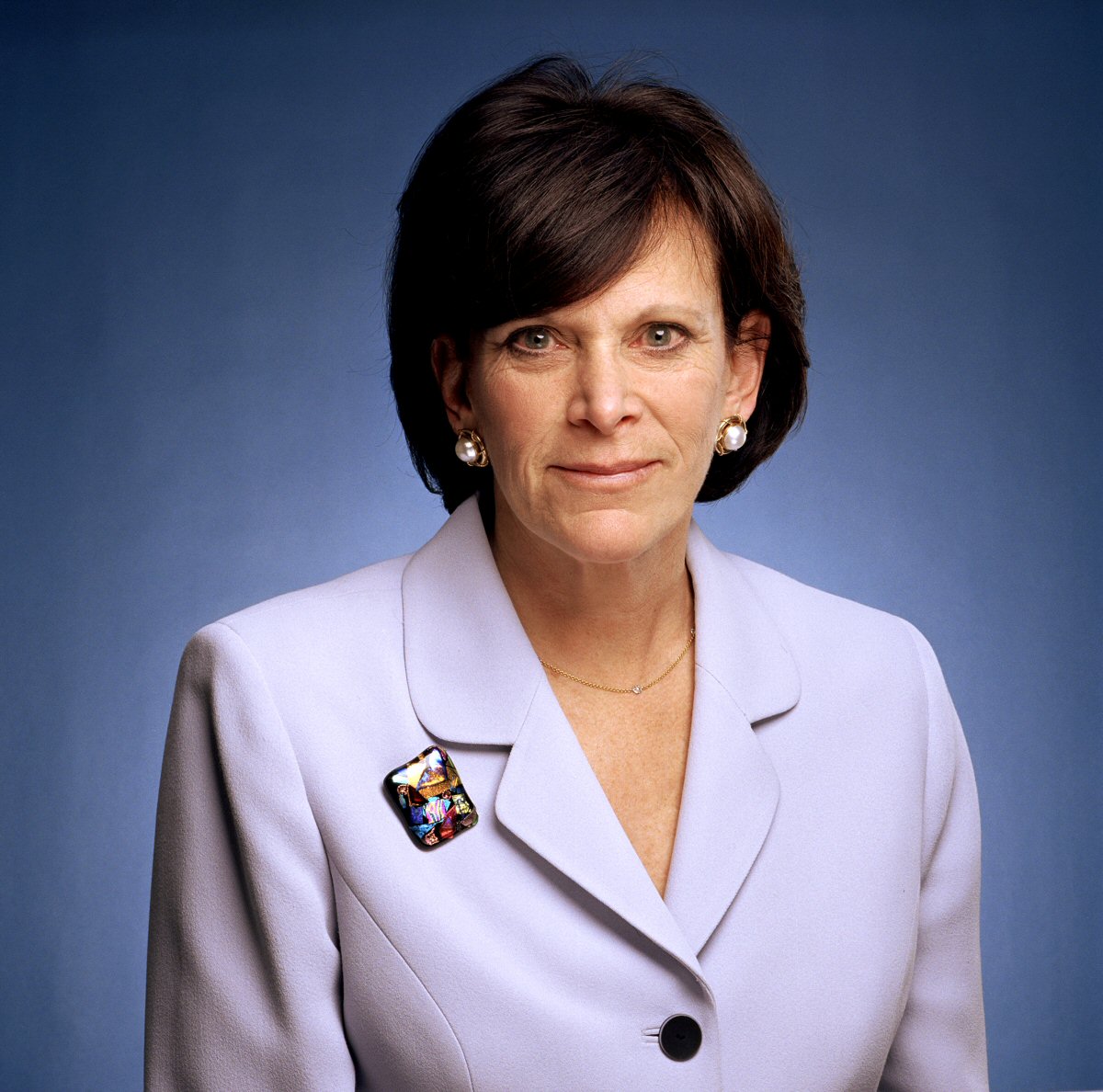Jessica Tuchman Mathews

Source: Getty
2015: A World Confused
U.S. foreign policy in a more difficult, intrusive world.
Norms and even basic tenets of international behavior have been scattered left and right in recent years: the annexation of Crimea by Vladimir Putin’s little green men and his stealth invasion of Ukraine by Russian soldiers “on vacation” with their tanks; the Islamic State’s combination of medieval mores and modern capabilities to govern as well as fight; China’s on-again, off-again provocations in the East and South China Seas; and, in Syria, the ruin of a recently functional state with the world unable to stop the human and physical destruction.
Much of the blame has been laid at the United States’ door, but there is much more behind what’s happening than the U.S. government’s tactical mistakes or its unwillingness to commit ground troops to new fronts of combat.
In the Cold War, America’s role in the world was self-evident—to lead the fight against the Soviet Union and communism worldwide. Individual decisions weren’t obvious, and there were often agonizing tensions between that overriding goal and American values. But Americans largely shared a commitment to what they understood to be their country’s necessary purpose abroad.
With the collapse of the Soviet Union that clarity ended, and ever since, Americans have floundered in confusion. Is our purpose to maximize American power or to spread our democratic culture? Must the United States be the world’s policeman—even when we are not directly threatened? Should we stay at home and concentrate on our own shortcomings, or feel compelled to blanket the world in free-market capitalism?
The debate may be couched in terms of regime change vs. nation building, obeisance to international law vs. exceptionalism, unilateralism vs. multilateralism, or interests vs. values. But behind the varying terminology is the same search for a guideline or framework for deciding when and where to commit money, blood, or political capital. Without that, polls show, the American people are no clearer than their leaders have been about when the United States should act and when not, and just as liable to radically switch positions as events unfold.
Meanwhile, the world has become a much more difficult, intrusive place. Nearly all of its 7 billion people are now in one marketplace. The Westphalian black box, in which what happened within a state’s borders was no one else’s business, is gone. Borders are now porous to people, crime, information, money, weapons, pollution, and pandemics. In this cauldron, the lack of an agreed foreign policy bumper sticker to define the U.S. role—a successor to containment—is all the more acute.
Notably, the United States is not alone. China is ambivalent—even schizophrenic—about its role. It has abandoned Deng Xiaoping’s precept that it should lie low while accumulating economic strength. That much is clear: the world no longer hears about “peaceful rise.” But there is ample uncertainty too, including apparently in Beijing, about how far China’s intentions extend. Its military buildup continues at a fast clip (though from a very low base), and its actions in the East and South China Seas over small, disputed islands and offshore areas have been provocative enough to fuel anxiety throughout the region. Most unsettlingly, sometimes China demands to be treated like a major power with all the rights (though not the responsibilities) of one. On other occasions, almost in the same metaphorical breath, it morphs into a still weak, still poor (on a per capita basis) victim of colonial abuse. The two make a toxic mixture.
India has threats to counter from neighbors—Pakistan and China—and a massive task at home of reforming a government that nurtures corruption and paralyzes economic growth. Japan, still astonishingly unable to apologize for heinous behavior during World War II, provokes angry nationalism in China. That, in turn, feeds Japan’s own right wing and a growing debate over the country’s military posture.
In the Middle East, Israel appears to have given up on peace and to have settled into a dead-end policy of growing belligerence that will make either a two-state solution or a stable one-state outcome impossible, but with no other obvious alternative.
Iran is close to what would be a historically important agreement to resolve the world’s concerns over its nuclear program. But it, too, is torn. It may yet decide, as Carnegie’s Karim Sadjadpour has explained, to put the interests of its Islamic revolution ahead of those of the Iranian nation and scuttle a final deal. (The U.S. Congress may make a tough choice unnecessary for Tehran by enacting premature sanctions over the failure to meet the negotiating deadline—thereby playing directly into the hands of the Revolutionary Guards and the rest of Iran’s right wing who profit from its isolation and confirming the supreme leader in his conviction that what the United States has wanted all along is regime change.) The Arab world is riven by vicious sectarian strife that will consume and define it for the foreseeable future. Saudi Arabia and the small Gulf states cannot decide which of two contending nightmares they like least: that the United States will make a nuclear deal with Iran or that negotiations will fail and Iran will become a nuclear power.
Alone among the major powers, Europe is not confused about its international role. Indeed, it is strikingly clear about its values, and where its comparative strengths in international affairs lie. But Europe as a whole has not yet confronted its eventual need to play a greater strategic part in assuring its own security and that of the region and countries farther afield. Europe remains so submerged in its immense union project that there is little capacity left to grapple with the world beyond its borders.
That leaves the riddle of President Putin’s Russia. Three years ago, Putin was shocked and his legitimacy deeply undercut by large street protests against his government. In 2012, hoping to divert attention abroad, as wounded leaders often do, he executed his own pivot to Asia, huffily turning his back on the West. The United States and much of Europe retaliated by officially snubbing the Olympic Games in Sochi that he had made his personal mission and on which he had spared no expense.
Russia intends to prevent Georgia or Ukraine from becoming members of NATO at all costs, and sees EU affiliation leading to EU membership and then to NATO membership as one extended slippery slope. But there were other ways to achieve that end, and decoding Putin’s long-term plan—if he had one—in invading and annexing Crimea and then sending weapons, fighters, and eventually Russian troops into eastern Ukraine is largely guesswork. True, the operations in Ukraine have won him the popularity of a wartime president. But Russia buries its dead soldiers at night, and the economic cost of sanctions is high and rising steeply. Putin badly underestimated Western unity and, especially, the strength of Angela Merkel’s leadership. And over the long term, Russia’s natural place is in Europe, not Asia.
So, in 2015, the United States will have plenty of company in its uncertainty about its foreign policies and core interests. Many past mistakes cannot be unwound: the only choice is to go forward within constrained options. There is an enormous agenda, but action is essential in four areas—Iran, Syria, Russia, and China.
Most important, the United States should continue to do whatever it can to reach a sound nuclear deal with Iran (as the administration has done thus far). That means Congress, in the country’s interest, must keep its sanctions weapon holstered until the negotiations fail or Tehran resumes nuclear activities it has suspended.
President Obama can no longer afford to prolong his ambivalence over the fate of Syria’s Bashar al-Assad. He needs to make a clear choice, and to recognize the glaring hole in his current policy, which simply doesn’t provide for an adequate ground force to fight the Islamic State in Syria. Without that, Syria becomes a sanctuary for the group, an unwilling sacrifice to the success of military operations against the jihadis in Iraq.
Nor ought Obama permit U.S. relations with Russia to continue in their present, frozen condition with no one at a senior level able to reestablish or interested in restoring a functioning relationship.
Finally, the United States needs to act on its expressed policy of rebalancing toward Asia. The message Beijing received from the so-called pivot was that Washington planned a policy of containing China. The fact that the United States did nothing to execute such a policy was not reassuring; just confusing. The rebalance without substance behind it is a lose-lose policy, allowing Beijing to fear the worst without strengthening U.S. interests.
Looking back a year from now, though, it’s likely that the most consequential development of 2015 will not have been any of the above. If, as now seems quite possible, oil prices settle at around $60 per barrel, less than half of their recent peak, that will be a global game changer. Virtually no economy and few economic relationships will be unaffected. There are any number of positive opportunities—geopolitical, economic, and environmental—that will open up if prices stay in this neighborhood for some years. Defining those opportunities and seizing them is the new top-tier priority for policymakers everywhere.
About the Author

Distinguished Fellow
Mathews is a distinguished fellow at the Carnegie Endowment for International Peace. She served as Carnegie’s president for 18 years.
- Washington Already Knows How to Deal with North KoreaIn The Media
- Trump Wins—and Now?Commentary
Jessica Tuchman Mathews
Recent Work
Carnegie does not take institutional positions on public policy issues; the views represented herein are those of the author(s) and do not necessarily reflect the views of Carnegie, its staff, or its trustees.
More Work from Carnegie Endowment for International Peace
- Beijing Doesn’t Think Like Washington—and the Iran Conflict Shows WhyCommentary
Arguing that Chinese policy is hung on alliances—with imputations of obligation—misses the point.
Evan A. Feigenbaum
- A China Financial Markets PostCommentary
Description of the post.
Michael Pettis
- How Far Can Russian Arms Help Iran?Commentary
Arms supplies from Russia to Iran will not only continue, but could grow significantly if Russia gets the opportunity.
Nikita Smagin
- Is a Conflict-Ending Solution Even Possible in Ukraine?Commentary
On the fourth anniversary of Russia’s full-scale invasion, Carnegie experts discuss the war’s impacts and what might come next.
- +1
Eric Ciaramella, Aaron David Miller, Alexandra Prokopenko, …
- Can the Disparate Threads of Ukraine Peace Talks Be Woven Together?Commentary
Putin is stalling, waiting for a breakthrough on the front lines or a grand bargain in which Trump will give him something more than Ukraine in exchange for concessions on Ukraine. And if that doesn’t happen, the conflict could be expanded beyond Ukraine.
Alexander Baunov













